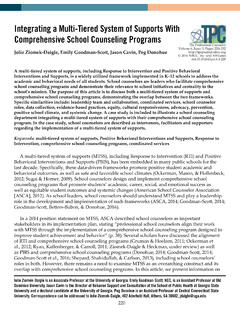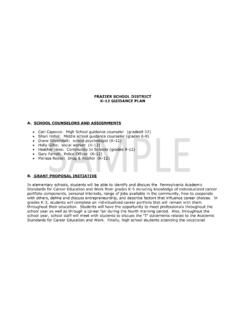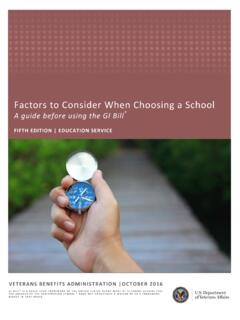Transcription of A School Counseling Program Evaluation
1 15 GSCA Journal 2010 | Volume 17, No. 1A School Counseling Program Evaluation :Utilizing Staff Perceptions to Guide and Shape Future Program PlanningHeather SherwoodHeather Sherwood is a professional School counselor at North Fayette Elementary School . She can be reached at North Fayette Elementary School 609 Kenwood Rd Fayetteville, GA 30214 for more information about this topic or by email at The author would like to thank Dr. Susan Boes for her helpful feedback and assistance throughout the process of the action research study. The ARS is a requirement of the University of West Georgia Specialist degree in the area of School Counseling , but is the research of the is paper describes an action research project evaluat-ing an elementary School Counseling Program in a large suburban Georgia city. Using staff surveys (which in-clude homeroom teachers as well as support teachers and paraprofessionals), interviews, and researcher observa-tions the Program was evaluated to determine strengths and weaknesses.
2 Th e results indicate that the staff mem-bers have a general understanding of the School counsel-ing Program s goals. Most participants indicated that the Program met the needs of the School and its students. Implications from the research pointed to a need for more direct collaboration of the professional School counselor (PSC) with teachers on a regular basis. Further research into the parent and student perceptions of the School Counseling Program is recommended. A School Counseling Program Evaluation :Utilizing Staff Perceptions to Guide and Shape Future Program PlanningWith a major focus on accountibilty for educators, Evaluation of all elements of student performance maxi-mizes student success. School Counseling programs must follow this trend and move toward greater demonstration of accountability through thoughtful Program evalua-tions. In the state of Georgia, academic compentencies are based on the Georgia Performance Standards (GPS); however, the state has not yet established these standards for School Counseling programs .
3 Individual counties have fl exiblity in the delivery and standards for School Counseling e purpose of this action research study (ARS) was to determine the staff perceptions of the School Counseling Program for an elementary School (PK -5th grade) in a large suburban Georgia city and to utilize this informa-tion to make improvements to the Program . Th e School s population is diverse in ethnicity and socioeconomic status: more than 50% of students are on free/reduced lunch status, and the student demograpic breakdown is 68% Africian-American, 14% Hispanic, 13% Caucai-san, 3% Asian, 2% multiracial. Class sizes are below the state average and numerous supports assist teachers in the educational process. With only one professional School counselor (PSC) for a School of almost 500 students, it is important that the School Counseling Program , which is modeled after the American School Counselor Associa-tion (ASCA) National Model, is regularly evaluated and changed to meet the needs of students.
4 Th is paper s pur-pose is to review the methods, outcomes, and limitations from the ARS to determine the Program s strengths and weaknesses. Th e interventions utilized for improvement are also discussed. Having interaction regarding the staff perceptions of the School Counseling Program will guide the PSC and the School Counseling advisory council in making changes to Program elements and goals to provide students with a Program that better meets their needs. Review of Related School Counseling LiteratureTh e literature related to this ARS identifi es two main themes: accountability for PSCs and their programs , and how staff perceptions of School Counseling programs im-pact changes within the programs . Th rough a review of this literature, the foundation for this ARS was estab-lished. Georgia School Counselors Association16A School Counseling Program Evaluation :Accountability and the Need for Program Evalu-ationsLike other professions, there is an increased demand for School Counseling programs to demonstrate account-ability and impact on student academic, personal/social, and career development (Beesley, 2004; Dimmitt, 2009; Whiston & Aricak, 2008).
5 Th e American School Coun-selor Association (ASCA, 2003) created a National Model for PSCs to utilize as a guide in the creation of programs . Th e model is comprised of four domains: foundation, delivery, management, and accountability. Th e account-ability domain promotes the need for PSCs to utilize data to drive the Program goals and demonstrate eff ectiveness (ASCA, 2003). Using data, the PSC should be able to demonstrate how the Program s interventions have as-sisted in student performance and success. Methods for Program Evaluations Th orough Evaluation of School Counseling programs can reveal the following: contributions that the Program makes towards educational successes, increased awareness, and further defi nition of the responsibilities of the PSC. Having this information not only builds on the knowl-edge about the Program but also leads to more eff ective interventions being utilized in the pursuit of assisting students (Dimmitt, 2009).
6 School Counseling Program Evaluation is necessary for the growth and improvement of the Program . ASCA outlines performance standards and recommends a Program audit for PSCs. Th e multi-faceted design assists PSCs in simplifying and evaluating each element of the Program . PSCs then utilize the in-formation in setting Program goals (2003). Methods for Program Evaluation can vary. Sample Program evaluations. Missouri, for example, evaluates School Counseling programs using a multifac-eted assessment of the components of the Program , su-pervision of personnel, and Program results. Th is School Counseling model places emphasis on feedback from stakeholders regarding mastery of competencies, and sat-isfaction with Program elements (Gysbers, Hughey, Starr & Lapan, 1992). By utilizing several sources of systemic data, PSCs had a more concrete picture of the impact of the Program . Conversely, other Program evaluations center more on the individual PSC and his/her personal contributions to the Program .
7 Littrell and Peterson (2001) focused their description of Program Evaluation on one PSC s Program and through extensive observations were able to assess the impact of the School Counseling Program on the School and its students. Although helpful in reference, attempt-ing to evaluate a Program using this method, would pres-ent major diffi culties for PSCs. Having outside observers enter a setting and conduct interviews related to the ef-fectiveness of a Program would be informative; however, most PSCs would fi nd this approach unrealistic in that limited resources would be available to utilize this meth-od of Evaluation . Many Evaluation techniques require feedback from stakeholders regarding their insights into the Program . Th is type of feedback can be diffi cult for stakeholders to provide, especially if the Program is not fully implement-ed or well publicized. Providing information in the form of brochures, or presentations to parents and other stake-holders promotes the School Counseling Program and the role of the PSC is made clearer to the stakeholders.
8 In turn, this improves stakeholder ability to access and eval-uate Program elements (Gillilan, 2006). Once stakehold-ers are knowledgeable about programs , they are able to communicate their needs through membership on advi-sory councils, and feedback in interviews and surveys. By advertising about programs , stakeholders will know more about the interventions and Program elements that are off ered to students (Lenhardt & Young, 2001). Teach-ers must be included in stakeholder groups who receive information on the School Counseling Program , as they consistently interact with students and are aware of stu-dent Perceptions of School Counseling Pro-gramsSurveying stakeholders is considered a useful tool in Program Evaluation , specifi cally with teachers and School staff as this helps to gain their perceptions of the Program . From teacher surveys, PSCs can obtain information on beliefs related to their roles and responsibilities.
9 Addi-tionally, being aware of teacher perceptions is important, as this information can impact the success of the Program (Jackson, et al., 2002). Teachers are more regularly in contact with parents and students, so they are more likely to suggest Counseling assistance to a student in need of these services. Furthermore, providing stakeholders with opportunities for providing feedback on School coun-seling programs , demonstrates their importance to the Program and concern for fulfi lling their needs (Reiner, Colbert, & Perusse, 2009). Validating the opinions of 17 GSCA Journal 2010 | Volume 17, No. 1A School Counseling Program Evaluation :stakeholders and integrating their needs into programs helps to guarantee that the Program is comprehensive in nature and will increase buy-in for the Program . Teachers are important stakeholders of School counsel-ing programs because of the infl uence they have on stu-dents and parents (Clark & Amatea, 2004).
10 Collaborat-ing with this stakeholder group about the Program helps to ensure the Counseling services are utilized. Clark & Amatea (2004) found in their studies of teacher percep-tions that building positive relationships with teach-ers was critical to Program success. Having a positive working relationship in which teaming and consulting between teachers and PSCs occurs will strengthen the School Counseling Program and allow for better utiliza-tion of it is diffi cult to generalize teacher perceptions studies, the information they yield is extremely helpful in measuring Counseling Program eff ectiveness (Beesley, 2004). Th is ARS builds upon the research found per-taining to other School Counseling programs that utilize School /staff perceptions to impact and evaluate the School Counseling e method for conducting this study is action research (AR). With this type of research, educators gather infor-mation to determine eff ectiveness of practices.
















